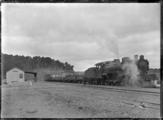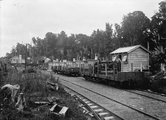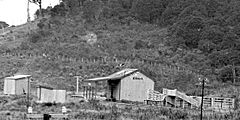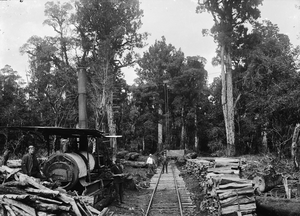Erua railway station facts for kids
Quick facts for kids
Erua railway station
|
|||||||||||
|---|---|---|---|---|---|---|---|---|---|---|---|
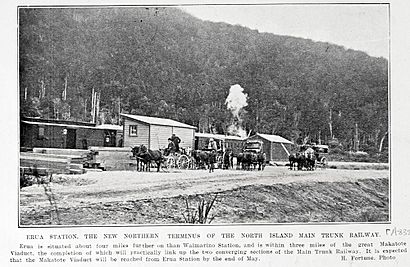
Erua was terminus of the line in April 1908.
Coaches took passengers to Ohakune to continue their rail journey |
|||||||||||
| Location | New Zealand | ||||||||||
| Coordinates | 39°13′41″S 175°23′55″E / 39.227998°S 175.398703°E | ||||||||||
| Elevation | 742 m (2,434 ft) | ||||||||||
| Line(s) | North Island Main Trunk | ||||||||||
| Distance | Wellington 340.16 km (211.37 mi) | ||||||||||
| History | |||||||||||
| Opened | 1 April 1908 | ||||||||||
| Closed | 13 September 1986 | ||||||||||
| Electrified | June 1988 | ||||||||||
| Services | |||||||||||
|
|||||||||||
Erua was a railway station located in the Ruapehu District of New Zealand. It was part of the important North Island Main Trunk railway line. The station served the small village of Erua. For one month in 1908, Erua was the end of the railway line coming from Auckland. The famous Makatote Viaduct and its tramway are about 3 mi (4.8 km) south of Erua.
Contents
The Story of Erua Station
The railway line was planned between Hīhītahi and Piriaka. Surveying for this section began in 1894. On April 1, 1908, the railway line from Auckland was extended. It reached Erua from the National Park area.
Erua as a Railhead
When the line reached Erua, it made travel easier. Passengers could now take a shorter coach ride to Ohakune. This coach journey was only about 14 mi (23 km). However, Erua's time as the main railhead was short. From May 1, 1908, the railway line was extended further. The new railhead became Makatote.
Station Operations and Buildings
The NZR took over the railway line sections. On November 9, 1908, they took over the line from Taumarunui to Erua. Then, on February 14, 1909, they took over the line south to Waiouru. Goods trains started running south from Erua on January 7, 1909.
In 1908, several buildings were constructed at Erua. These included four 5-room houses for railway workers. A 6th class station building was also built. It had a shelter shed that was 23 ft (7.0 m) by 11 ft (3.4 m). There were also urinals on a platform 200 ft (61 m) long and 15 ft (4.6 m) wide.
For goods, a shed measuring 20 ft (6.1 m) by 30 ft (9.1 m) was built. It had a verandah. There was also a loading bank, yards for cattle and sheep, and a cart approach. A passing loop was available for trains. This loop was long enough to hold 49 wagons. Erua was known as a tablet station from 1908. This system helped control train movements safely.
Station Life and Closure
A Post Office operated at the Erua station from 1912 to 1937. Sadly, on May 30, 1921, the station building burned down overnight. The station stopped handling most goods traffic on August 11, 1969. It fully closed to all traffic on September 13, 1986. This closure happened before the railway line was electrified. Today, only a single railway line passes through where the station once stood.
Timber Industry at Erua
Like many other stations along the North Island Main Trunk (NIMT) line, Erua was important for the timber industry. Many timber mills used the station to transport their wood.
NZR's Own Sawmill
The New Zealand Railways (NZR) even opened its own forestry block near Erua. This was to supply timber to the Frankton Junction Railway House Factory. In 1924, 57 people worked in this forestry block. However, the number of workers decreased from 1927, and the block closed in 1928. To help with this work, NZR built a 4.2 km (2.6 mi) siding from Pokaka. This siding was used until about 1932.
Other Timber Companies
In 1930, a special lock was added to the Karioi Sawmill Co.'s siding. This siding was located between Erua and Pokaka. Several other timber companies also operated in the Erua area. One of these was Wanganui Sash and Door, whose tramway closed in December 1956. Waikune Prison also had a sawmill near the station until 1927.
Marton Sash and Door Tramway
Crighton Bros operated a tramway that stretched about 11 km (6.8 mi) west from the Erua station. In 2014, some parts of this old tramway were turned into a 16 km (9.9 mi) cycleway near Marton. The Marton mill at Erua burned down in 1939. However, it still had a tramway in use as late as 1942.
 | John T. Biggers |
 | Thomas Blackshear |
 | Mark Bradford |
 | Beverly Buchanan |


